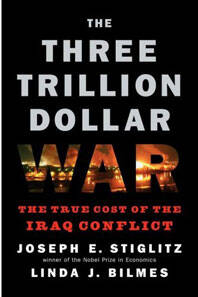The Trillion-Dollar War
From the beginning, the Bush administration has refused to give an accurate and responsible reckoning of the costs of the Iraq war. From underestimating budgets to requesting funding through special supplemental appropriations, to cutting taxes for the wealthy that resulted in financing the war through international borrowing, financial management of the war has been a case study in fiscal irresponsibility. With the cost of the war now close to a trillion dollars, the Nobel Prize-winner Joseph E. Stiglitz and Linda J. Bilmes of Harvard’s Kennedy School of Government have written an eye-opening study on the deeply flawed economy of the war. The Three Trillion Dollar War: The True Cost of the Iraq Conflict (Norton) surveys the financial mismanagement and the various costs of the war (in budgetary choices, veterans’ care and undermining of the economy) and recommends reforms for the future.
What would one trillion dollars buy? According to the authors, “A trillion dollars could have built 8 million additional housing units; could have hired some 15 million public school teachers for one year; could have paid for 120 million children to attend a year of Head Start; or insured 520 million children for healthcare for one year; or provided 45 million students with four-year scholarships to public universities.”
The $3 trillion figure is an estimate of the full cost of the war, including the years after withdrawal, with support for veterans, rebuilding of the military and payment of the debt. To the authors’ credit, most of the reforms they propose have to do with the compensation and care of Iraq war veterans. They propose, for example, doubling and tripling payments to National Guard and Reserve troops forced to do repeated combat tours and shifting the burden of proof from veterans to the government regarding eligibility for health care benefits.
Fallon’s Vision
The unexpected resignation March 11 of Adm. William J. Fallon, commander of U.S. forces in the Middle East, after only a year in office raises renewed questions about the administration’s intentions in the region. The admiral, reputed to be one of the military’s outstanding strategic thinkers, is believed to have pressed for a more rapid transfer of troops from Iraq to Afghanistan and to have encouraged diplomacy over military threats in dealing with Iran. In a part of the world with “five or six pots boiling over,” Admiral Fallon is reported to have said in a recent Esquire profile, “our nation can’t afford to be mesmerized by one problem.” That problem, of course, is Iraq. The White House has linked the president’s legacy to at least the short-term success of the military surge there, even as conditions worsen in Afghanistan and Pakistan. The admiral also appears to have encountered an obstacle in the White House’s special attachment to General David H. Petraeus, the commander in Iraq and technically the admiral’s subordinate, who favors extending a sizable U.S. presence in Iraq, preventing a timely transfer of troops to the Afghan front. The Esquire writer Thomas P. M. Barnett did Admiral Fallon no favors by describing him as the one person whose opposition stood athwart the administration’s march to war with Iran. As the admiral begins his retirement, responsible officers and military officials need to keep their eyes focused on his strategic vision: success in Afghanistan and the avoidance of war with Iran.
Funds for AIDS Relief
The U.S. House Foreign Affairs Committee and the Senate Foreign Relations Committee have approved a bill that authorizes up to $50 billion for the President’s Emergency Plan for AIDS Relief, known as Pepfar, over the next five years. The reauthorization provides assistance to Africa and to additional countries in the Caribbean, South and Southeast Asia, and Central and Eastern Europe. The bill provides funds to combat tuberculosis and malaria in addition to AIDS. Money will also be used to train some 144,000 new health care workers to care for people infected with H.I.V.
Cardinal Justin Rigali of Philadelphia, chairman of the Catholic Bishops’ Committee on Pro-Life Activities, commented that “the new bill reflects a commitment to saving human lives as well as our solidarity with those suffering overseas. It is vital to preserve and expand proven life-saving programs, especially abstinence and fidelity education, while refusing to dilute and distort a successful AIDS relief program with family planning and ‘reproductive health’ activities.”
Praise also came from Unaids in Geneva, which commended the United States for sending a strong signal that it is committed to maintaining its leadership role in the global response to AIDS. The House version of the bill is expected to reach the floor in early April. The Senate should also pass this bill in time for President Bush to point to this sign of the generous and compassionate nature of the American people at the Group of Eight industrialized nations summit meeting in Japan on July 7.








